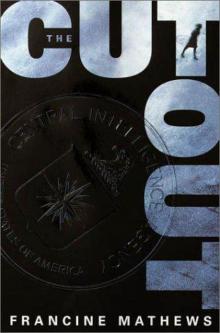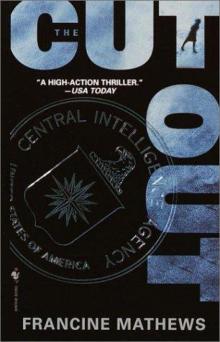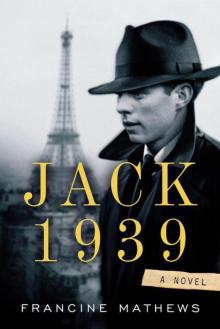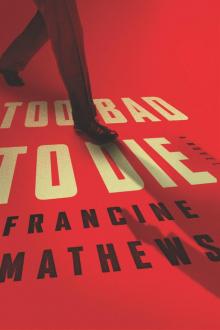- Home
- Francine Mathews
The Cutout Page 4
The Cutout Read online
Page 4
“And did he succeed?”
The Counterterrorism chief hesitated. “I believe he was closer to penetrating them than we’d ever been before.”
Dare took a turn around the room, thinking it through. “Thirty April bombed a plane that Eric Carmichael was supposed to be on. Is that why the plane went down? Because Eric was on the passenger list? It seems a bit excessive, killing two hundred and fifty–plus people in order to get one man—but we know that Krucevic’s boys are a law unto themselves.”
“Or …” Scottie said delicately.
“Or Eric Carmichael was working with 30 April well before MedAir 901, and got the bomb on that plane himself. Again, a bit over the top as a means of declaring oneself dead—but who’s to argue with the irrational?”
Involuntarily, Caroline shook her head.
“You don’t think so?” the DCI challenged. “How much did you know about your husband’s work in Budapest, Carrie?”
I knew about silence. I knew withdrawal. The shrouded figure in the bed each morning, the retching over the porcelain bowl.
“Very little,” she replied evenly. “Eric was always discreet about operational matters.”
“Even with his wife?” The DCI was incredulous.
It was what they all expected, Caroline thought, this collusion of marriage. No possible way to excuse her ignorance. She watched them thinking: What kind of wife were you, anyway?
“Eric always protected me,” she attempted. “He told me nothing. I was the person most at risk besides himself.”
Dare snorted. “Risk! You knew what you were getting into when you married him, Carrie. There were always several Eric Carmichaels. It was a crapshoot which would surface on any given day.”
“Of course.” Caroline bit down on the edge of anger, managed to suggest calm. “Eric was trained to live a lie. That’s what case officers do. And if you’re good at your job—if you work the hard targets—the lies start to seem like the only truth you’ve got.”
“Hear, hear,” Scottie murmured ironically.
Caroline ignored him. “Thirty April operates out of Central Europe. It was clear Eric and I had been sent to Budapest for that reason. Of course I put two and two together. But I never knew how close Eric had gotten to them. And when he was killed, I thought he’d failed.”
“And rather spectacularly, at that.” Dare’s tone was brisk. “How encouraging to learn instead that he succeeded in penetrating the bastards. Now if we only knew why.”
“He wasn’t on MedAir 901 when it blew up, obviously. I can’t tell you why. I don’t know.” Her voice rose—was she defending Eric? Or herself? “I don’t know how he came to be in Berlin this morning. But I do know that Eric Carmichael had a visceral hatred for terrorists and for 30 April in particular. He would never adopt their methods.”
“We saw him today in that chopper, Mad Dog, kidnapping the Vice President of the United States.”
It was unlike Cuddy to lash her so brutally; he was an analyst, too, he lived by his objectivity. But the anger in his voice was entirely personal. Eric’s defection had rocked Cuddy’s world.
“Isn’t it just possible that once Eric discovered his plane was hit—that he was officially dead—he decided to stay that way? That he infiltrated 30 April in order to nail them for MedAir 901?”
“Caroline,” Scottie said quietly.
But she persisted. “For all we know, he showed himself to us deliberately this morning. What if it was the clearest message he could send? You’ve got a guy on the inside.”
“Whom we wouldn’t need if he’d done his job in the first place!” Cuddy again, brittle with exasperation.
“We can’t know what Eric is doing,” Scottie declared, “or what he might have done two years ago. Whether he thinks he’s operating under deep cover or not, the truth is, he’s gone completely AWOL. He’s committed an act of terrorism against the U.S. government. Twenty-eight people died this morning. Seven more are in critical condition. Our Veep is missing. We can’t cover him on this one, Carrie.”
“A guy on the inside,” Dare repeated thoughtfully. “Have you considered what President Bigelow is going to say when he learns there was a CIA case officer on that chopper?”
Caroline looked at Scottie. The Terrorism chief did not immediately reply. He merely studied his Director with a frank expression of bemusement, the one he reserved for particularly boring dinner partners. It was obvious that the President would have all their asses in a sling.
“We’ll be stripped to our shorts and whipped out of town,” Dare informed them succinctly. “We’ll be hauled before a Congressional investigation to explain something none of us understands. We’ll be—”
“Ridiculed and pissed on by every son of a bitch inside the Beltway,” Scottie concluded.
“And we’ll be shut out of the Payne investigation.” Caroline’s voice was tight. “When, at the moment, we’re the only ones with a lead.”
“We’ve got no choice,” Cuddy Wilmot protested.
“Haven’t we?” Dare shot back. “Think what you’re saying, Wilmot. None of us will be immune when the press gets their knives out. Everything will be distorted: Eric’s history, our investigation of MedAir 901, all your work for the past two and a half bloody years. All our efforts to save lives and put these psychos behind bars. Crucified before a television audience of two hundred million.”
“And meanwhile,” Caroline said, “Sophie Payne is still out there. Trying to get home.”
“That German footage?” Dare asked. “Is it being shown on CNN?”
“Yes.” Scottie reached into his breast pocket for cigarettes, although he had quit smoking months ago. “And probably the other networks as well.”
Dare’s dark blue eyes locked on to Caroline’s. “How recognizable is your Eric?”
As a fox in a den, as a shroud among the living. The scent of lemons in the unquiet dark —
She did not quite answer the question. “When the FBI realizes that Payne has been kidnapped, they’ll shove that tape under a microscope.”
“They won’t be looking for a dead man.” The DCI spoke with decision; she had weighed the options and jumped. “We have no choice but to stand behind Eric Carmichael. He’s our curse and our gift. We blow his cover and we blow our own. But if we let him run for a bit—and follow where he leads—maybe we can salvage something from this travesty.”
“You’re suggesting … a cover-up.” The lack of emotion in Scottie’s voice betrayed his shock.
“I’m suggesting we admit the truth,” Dare replied. “With the quality of the videotape and the chaos in the square, which of us can be certain what we saw? Eric Carmichael—or a man who simply looks like him? It would be foolhardy in the extreme to say anything to anyone—much less the President—without more proof.”
“And foolhardy not to follow every lead,” Caroline added.
Dare nodded once. “Right.”
Cuddy Wilmot shifted uneasily in his chair and studied his hands. Caroline kept her face expressionless and her hope tamped down. Hope for what, exactly? Eric’s redemption? He wouldn’t thank me.
Scottie steepled his graceful fingers and affected an air of candor. “Forgive me, Director, but I must object. Anything short of Eric Carmichael’s immediate disavowal is far too dangerous, for ourselves and the Intelligence community.”
“We live in a dangerous world, friend.”
“Do you realize what you’re asking?” Scottie straightened in his chair and assumed the look of wounded dignity he usually reserved for Congressional Oversight. “You’re asking us to lie.”
“I am asking you to do exactly what you pledge to do every day of your lives,” Dare told him crisply. “Disclose information on a need-to-know basis. Right now, Scottie, nobody needs to know about Eric Carmichael.”
He opened his mouth; she raised one hand, as if under oath.
“I may think entirely differently in a few days. Events may so order themselves that a rapid
disclosure is inevitable. But I see no reason to rush to judgment now. In fact, I think such a course would prove injurious to the kidnapping investigation and, ultimately, to the survival of the Vice President.”
“You’re serious.”
“Never more so.” She held his gaze. “But I need your commitment, Scottie.”
“Or my resignation. Jesus!”
“You won’t resign. You wouldn’t throw that woman to the dogs and walk away.”
“But neither do I intend to go to prison. Not for you, Director Atwood, and certainly not for Eric Carmichael!”
“I wouldn’t expect you to.” There was a trace of amusement in Dare’s voice. “Give me three days, Scottie. No more. Seventy-two hours of effort behind the scenes. State and FBI will head up the investigation, of course—and we’ll be expected to scour the world for information. We’ll try our damnedest to figure out where the Veep is and how to reach her. And we’ll support the President in every possible way—short of full disclosure. Full disclosure gets us all screwed. And Payne dead.”
Dare had deliberately raised the ante. No one wanted to be responsible for the Vice President’s death. Caroline felt a spark of admiration for the DCI; Scottie was silenced, Cuddy Wilmot overwhelmed. Dare had the guts to manipulate them all. But Caroline clung to her line like a drowning woman.
“For the moment,” the DCI concluded, “we keep all knowledge of Eric Carmichael’s survival completely to ourselves. Not one word of what has passed here is to leave this office. End of discussion.”
FIVE
Langley, 9:30 A.M.
WHEN THE THREE OF THEM had left her, Dare sat still for a moment and stared at her hands. The fingers had once been beautiful; now they were crabbed with age and misuse. She touched her cabochon topaz and remembered the man who had given it to her. Then she put her head down on her desk and closed her eyes. She was fifty-three years old—young to command such power, too old to conceive of doing anything else. If the Agency’s peril in the present situation was great, so was her own. Never mind that Eric Carmichael had walked on her predecessor’s watch. If he was found and exposed, Dare would have to resign.
She was the first woman ever to command the comfortable suite apportioned to the Director of Central Intelligence. They were all behind her, the shadow men, their portraits ranked on the headquarters walls: pipe-smoking Allen Dulles, jaunty unto death; slick-haired Richard Helms, with all the self-possession of an undertaker; gentleman Bill Colby, the perfect dinner partner; and ruthless Bill Casey, whom she’d battled and served. A preponderance of Bills, now that she thought of it— and these men had other things in common. All were entrenched in the old-boy net, the cozy club of prep schools and Ivy League, of wartime service in the OSS, of an age when espionage was sanctified by David Niven in a blue blazer. All would have looked on Darien Joan Atwood as an outrage—a competent secretary, perhaps, but not to be trusted with a table in the executive dining room.
They had bequeathed her this office, a bed and full bath available for use in twenty-four-hour crisis, a conference area with a massive cherry table, an adjoining suite for her personal assistant, and a bevy of secretaries. She had a C-141 Starlifter at her disposal, and an Air Force colonel to fly it. A navy blue armored sedan chauffered by a bodyguard. Even a personal elevator— with a secret access code—that carried her directly from the seventh floor to her private garage.
But what Darien Atwood really commanded was an intricate hierarchy of power. The CIA was only the most obvious borough of her realm, the neighborhood she called home. As Director of Central Intelligence, she held the reins of the entire Intelligence community: the eavesdroppers and decoders at the National Security Agency, the overhead reconnaissance satellite teams, the military-minded missile counters plugging away at the Pentagon. They all reported to their chain of command, of course; but their agency chiefs were in thrall to Dare.
To be a woman in such a position was to invite flak. Dare survived her Senate confirmation hearings on the strength of her record—she had spent twenty-three years as an analyst at the CIA, rising steadily through the bureaucracy, and done two tours of duty on the staff of the National Security Council—but many of the doubts were voiced in private. Was she tough enough? Could she adequately assess the nature of security threats? Would she be snowed by hostile Intelligence forces (the Russians came to mind) posing as newfound friends? Did she, in short, have the balls to do a man’s job?
And now, Dare thought, Eric Carmichael would answer that question for all of them. Carmichael’s fate, and that of the woman he held captive, would make or destroy Dare’s career. She smiled derisively. Either way, there’d be a Newsweek cover in it.
Eric she had already dismissed; there was no road back from the place he had gone. She was taking a terrible risk by suppressing his identity; some would call it criminal. There would be no defense if she failed—only a Congressional hearing and a plea bargain for immunity. But Eric alone might lead them to Payne, and in the Vice President’s salvation, Dare read the future of the CIA. What had Abraham Lincoln said? “I must bury the Constitution in order to save it”? Her present position was precisely like that.
The telephone on her desk shrilled a summons. She allowed it to ring once, then picked up the receiver. Jack Bigelow wanted her in the Oval Office.
SIX
On the Czech-German Border, 3 P.M.
SOPHIE PAYNE AWOKE TO THE SOUND of a woman’s sobbing.
The weeping went on and on, inconsolable, repetitious, maddening beyond belief. She wanted to scream for silence, but, too weak and too detached to part her lips, she submitted to the monotony. At some point she would be forced to open her eyes—forced to take up again the questions she knew were hovering—but for now, it was enough to float in velvet and ask nothing at all.
Until the moment she realized that the sobbing was her own.
They had stuck a needle in her arm. She was coming out of a drugged sleep.
She sat up sharply and slammed her head against a flat surface. I’m under a table, she thought. They left me under a table. But why is it so dark? I can’t get the blanket off.
She tried to reach for her face. No good; her hands were tied behind her back. She struggled to open her mouth, but her lips were sealed shut, probably with tape. The blanket muffling her head was some sort of hood. But she could still hear—the sobbing was proof of that. However blind and mute they had made her, they could not stop her ears.
Sophie eased herself to the right, cautiously, and felt another slope of wall. The same thing to the left. She was confined in a box about three feet wide and five feet long.
A coffin. She was in a coffin, buried alive.
The horror of it made her panic. Her wrists strained against each other, the tape cutting cruelly into them; the tape held firm. Between the gag over her mouth and the hood over her head, she was suddenly suffocating. She gasped for air, stars exploding before her eyes. Then she sank back, whimpering with self-pity, and tried to breathe through her nose.
And in the silence, she felt it.
The box was moving.
It crept sideways, then ground to a halt. Something—an axle? A brake pad?—squealed faintly. The box slid sideways again. Shuddered to a halt. The squeal of the brake.
She was in the trunk of a vehicle that was barely moving. A car? Were they approaching an intersection? Or just caught in heavy traffic?
Either way, there might be people around.
She sat up and butted her head hard against the trunk lid. Did it again and again, braying through her bonds like a crazed animal, until pain forced her to stop.
No one delivered her.
The car eased forward, slid to a halt. Eased forward again. Perhaps it was a freeway, snarled by an accident, and in the general frustration the rocking trunk went unnoticed. Or maybe the car was filing through a toll-booth.
Then comprehension came like a piercing ray of sun, and in her mind’s eye Sophie saw it clearly: a snaking
ribbon of stalled traffic tiny as Matchbox cars, the German border crossing far below. She had glimpsed a similar scene the previous day from the privilege of an Air Force chopper, on her way into Berlin.
Or was it two days ago, now? A week?
Terror washed over her again. How long had she been in the trunk? How long had she been missing?
The car eased forward, braked. There was a pause, and then a man’s voice said quite distinctly, “Thanks. Have a good day.”
He had retrieved his passport from the border control and hailed them in Boston-accented English. She was being kidnapped by an American. What the hell was going on?
Sophie Payne slammed her head against the trunk roof and screamed.
The car gained speed and plunged into another country.
SEVEN
Langley, 11 A.M.
I’M GOING TO COUNT TO THREE,” Eric says, “then I want you to jump.”
Caroline is sitting alone in the fourth-floor bathroom of the Old Headquarters Building, safely concealed within a locked stall. Somewhere beyond the bathroom door, Sophie Payne is still missing and the work of the CTC continues; but Caroline’s mind has fled backward a decade or more, to the heat of a Tidewater spring, the black cloud of no-see-ums hovering before her face, the peculiar smell of sweat when it is generated by fear.
She is crouching in the open doorway of the jump tower. A canvas harness bites into her chest. The white paint of the old wooden struts is flaking away under her moist palms. Forty feet below is a blur of grass and dirt bisected by the rope line she is expected to trust. To her back, unseen but felt, is the mass of others—braver than she, quieter in their panic, knees poised for ascent along the three flights of stairs. She has no choice but to jump.
Eric’s hand in the small of her back. The cool pressure of it through the dampness of her fatigues.

 Death in the Off-Season
Death in the Off-Season Death in Rough Water
Death in Rough Water The Alibi Club
The Alibi Club Death of a Wharf Rat
Death of a Wharf Rat The Cutout
The Cutout The Secret Agent
The Secret Agent The Cutout cc-1
The Cutout cc-1 Jack 1939
Jack 1939 Death in a Cold Hard Light
Death in a Cold Hard Light Blown
Blown Too Bad to Die
Too Bad to Die